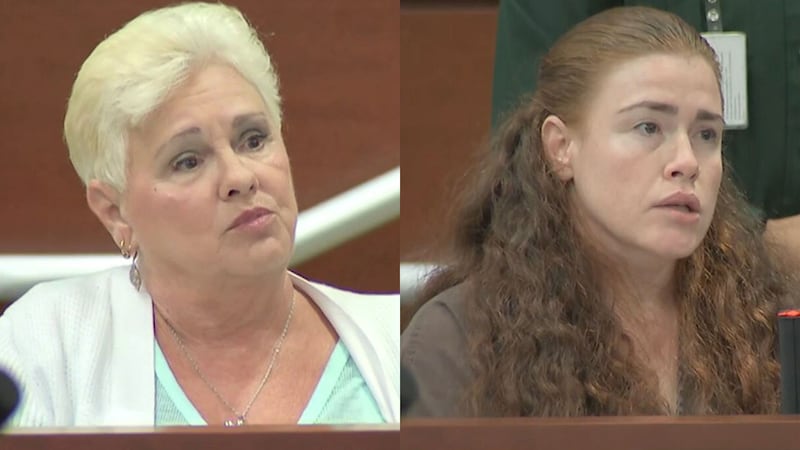FORT LAUDERDALE, Fla. — The defense team focused on saving the Parkland school shooter’s life called expert witnesses — including the well-known pediatrician who coined the fetal alcohol syndrome term in the 1970s — and the prosecutors who are seeking the death penalty questioned their reliability on Tuesday in Broward County court.
The defense first called Paul Connor, a neuropsychologist, on Monday, to testify about fetal alcohol spectrum disorders, or FASDs, conditions caused by a mother who drank alcohol during pregnancy. FASDs may affect up to 5% of the population, according to the U.S. Centers for Disease Control and Prevention.
Before Connor and the jury returned to the courtroom on Tuesday morning, the defense and the prosecution argued about Connor’s decision not to record a video of his testing procedures during his five-hour visit with Cruz on May 20, 2021, at the Broward County main jail.
Connor said he performed several neuropsychological tests to assess Cruz’s thinking skills and behavior. The tests, he said, assess areas such as memory, motor function, perception, and verbal ability. The defense then asked the FASD leading expert to use the test results to make conclusions about the health of Cruz’s brain.
The prosecution attacked the reliability of the test results and took issue with the experts not taking into account the evidence of the 2018 Valentine’s Day massacre at Marjory Stoneman Douglas High School, including a video confession and surveillance video, when they made their assessments.
VIDEO OF TESTING

Assistant State Attorney Carolyn McCann told Broward Circuit Judge Elizabeth Scherer that Chief Assistant Public Defender Melisa McNeill was “disingenuous” when she required the prosecution’s two experts to record their interactions with Cruz, but didn’t hold her long list of experts to the same standard.
Assistant Public Defender Nawal Najet Bashimam, and not McNeill, responded to McCann’s accusation in court and put the blame on the prosecution team.
“The state chose not to request it,” Najet Bashimam said.
Scherer said Chief Assistant State Attorney Mike Satz would be allowed to raise the issue in court in front of the jury without implying that Connor broke the law. Najet Bashimam said she didn’t want Satz to phrase his question in a way that implied Florida law required the video.
Satz’s first question to Connor in front of the jury after the attorneys’ discussion: “Are you aware, according to Florida law, the state was required to videotape their experts’ evaluations?”
Connor answered in the negative. The tension in court continued.
QUESTIONING CREDIBILITY

Satz also asked Connor about a motor test that required Cruz to use his index finger, when Satz referred to the finger as the “trigger finger,” Connor said he preferred to call it the “pointing finger.” Satz questioned the test results indicating a deficiency.
“Were you aware that the defendant, in this case, won a sharpshooter badge?” Satz said about Cruz’s U.S. Army Junior Reserve Officers’ Training Corps achievement with a pellet rifle.
Connor answered in the negative. Satz also had Connor admit that he had excluded individually labeling several tests that Cruz tested well for in a graphic that he had shown to the jury during his testimony on Monday. Connor said that although it wasn’t labeled on the graphic he had considered the data.
“The overall score is incorporated into the graph,” Connor said.
Satz had Connor also establish that The Diagnostic and Statistical Manual of Mental Disorders, which clinicians and researchers use, categorized neurobehavioral disorders associated with prenatal alcohol exposure as a “condition for further study” and not an official disorder.
Satz later asked Connor if he had considered the surveillance video of Cruz during the massacre in the 1200 building to make his assessments, and Connor answered in the negative.
“That’s not what I am being asked to do,” Connor said.
LEADING EXPERT’S DIAGNOSIS

After Scherer dismissed Connor, capital defense attorney Casey Secor called Dr. Kenneth Lyons Jones, a pediatrician and academic researcher who is known as the “Father of fetal alcohol syndrome” for coining the term with the late Dr. David Smith in the U.S. in 1973, and for his decades of research and advocacy.
“The fatal alcohol spectrum disorder is not a diagnosis; it’s an umbrella term,” said Jones, the chief of The University California San Diego Health’s Division of Dysmorphology/Teratology.
After meeting with Cruz for about an hour in early August of 2021 at the main jail, Jones said the results of a physical exam showed Cruz did not have fetal alcohol syndrome, one of the medical disorders collectively labeled as FASDs by the Institute of Medicine of the National Academies.
Jones said that after reviewing Connor’s test results, but not the raw data, and some of the records in the case, but not those related to Cruz’s crimes, he concluded that Cruz “does fulfill the criteria” for alcohol-related neurodevelopmental disorder, which causes intellectual disabilities and behavior problems.
Secor asked Jones to establish a causal relationship between the ARND diagnosis and the crimes.
“Do you think that the disorder in and of itself causes people to commit murder?” Secor said.
Jones, who said he doesn’t charge for testifying in court as an expert, answered in the affirmative and also said he had treated a lot of people with ARND who have committed murder.
Jones said records showed Brenda Woodard, Cruz’s biological mother, received “very poor prenatal care,” “her nutritional status was horrible” and there was evidence that Cruz’s fetus was “in distress” inside her uterus.
“I know I have never seen so much alcohol consumed by a pregnant woman,” Jones said referring to the evidence that he said he reviewed.
Jones said Woodard’s medical records showed a nurse reported psychosocial problems by writing, “Patient admits to alcohol abuse.” Connor pointed to the same record on Monday.
“Alcohol has the greatest impact,” Jones said comparing its effect on the fetus’s developing brain to that of illicit drugs, which Woodard allegedly also consumed while pregnant.
Jones said although Cruz’s weight and head size were normal now, there were times when that wasn’t the case, and this, he said, could be indicative of issues with brain development. Satz interrupted the testimony to tell Scherer that Jones was speculating.
“The gentleman will talk forever,” Satz said in protest.
Once Scherer allowed Jones to continue with his testimony, he said children who are affected by fetal alcohol exposure are often “aggressive” and have memory problems.
“Temper tantrums are just horrible,” Jones said adding oftentimes the parent becomes the subject of the aggression.
The jury had already heard two family friends testify in court about the severity of Cruz’s tantrums as a boy and as a teen.

Jones also said Cruz fit the cognitive impairment criteria for ARND. He said the impairments can vary from mild to severe and encompass a broad array of deficits.
“A deficit can mean, you can do something, but you do it very poorly?” Secor said. Jones agreed.
After Jones started to discuss how “stigmas” often complicate the prevention, diagnosis, and treatment of FASDs, Satz interrupted twice and Scherer asked Secor to keep Jones focused. Jones continued
“The fetal alcohol syndrome is associated with a very specific neurobehavioral profile ... and as such, they need specific intervention programs,” Jones said adding Cruz didn’t have the appropriate diagnosis or adequate treatment.
Jones said children with ARND are often diagnosed with attention-deficit/hyperactivity disorder, a chronic condition characterized by hyperactivity, and impulsiveness, or with autism spectrum disorder, a developmental disability.

The jury learned from Cruz’s two psychiatrists and a psychologist that he had been diagnosed and treated for ADHD and that they had recorded he had exhibited some symptoms of autism.
“These kids need an external brain,” Jones said later adding that it is because ARND is a “brain-based disorder.”
A child who is diagnosed with ARND needs to be in a medical home with a “fetal alcohol spectrum disorder informed physician” long term because medication alone to treat the symptoms isn’t enough, according to Jones.
“There are now interventions that have been developed that are specifically related to helping children,” Jones said about kids with ARND.
Jones also listed two of Emory University’s programs: Going the Extra Mile: Improving Math and Behavior in Alcohol Affected Kids, or MILE, and GoFAR, an intervention for affective and metacognitive control in FASDs.
Jones also added the Families Moving Forward program in Sarasota was active when Cruz was a child and he said The Florida Department of Education was “very progressive” with its issuing of a resource guide for teachers in 2005.
“It’s incredible to see what homeschooling can do for these kids,” Jones said.
Jones said Cruz’s grief after his adoptive mother, Lynda Cruz, died had to have been “devastating.” His adoptive father, Roger Cruz, died of a heart attack on Aug. 11, 2004, when he was five. Lynda Cruz died of complications with pneumonia on Nov. 1, 2017. Woodard died of cancer last year.
Satz mentioned Jones had said children with ARND had poor planning skills, and yet evidence showed Cruz planned the MSD massacre. Satz asked Jones if he was aware of Cruz’s online searches before his adoptive mother died in 2017 and before the massacre in Parkland.
“Talk about planning,” Satz said while listing Cruz’s searches and preliminary actions — most of which Jones said he wasn’t aware of.

As of Tuesday afternoon, the defense team had called 26 witnesses in 11 court days, including Carolyn Deakins and Danielle Woodard, who both testified about Cruz’s biological mother’s drug and alcohol use while pregnant.
McNeill delivered her opening statement on Aug. 22 and later said on Aug. 23 in court that her team had over 80 witnesses to call. Prosecutors rested their case on Aug. 4, after calling 91 witnesses in 12 days, including the 17 survivors injured and 34 victim impact statements.
In October 2021, Cruz pleaded guilty to — 17 counts of murder and 17 counts of attempted murder — crimes he had committed when he was 19 years old. He turns 24 years old on Sept. 24.
The defense needs only one of the 12 jurors to oppose the death sentence. Without a unanimous jury vote, Cruz will be sentenced to life in prison without the possibility of parole.
Watch the 4 p.m. report
Watch the 5 p.m. report
Watch the 6 p.m. report
WATCH proceeding with Local 10 News Anchor Janine Stanwood on FacebookLive
Relevant case: Atkins v. Virginia is a 2002 Supreme Court ruling against the death penalty sentence for defendants with mild to severe impairment in intellectual ability equivalent to an IQ of 70 to 75 or below. Cruz’s full-scale IQ, according to Connor, was 83. (Eighth Amendment case)
Related social media
As listening to #ParklandShooting testimony was curious about the possible intersection of #FASD and #criminal behavior. 🤔 “Research shows that individuals with #FASD are unable to learn from standard methods of punishment, such as #incarceration.” https://t.co/M3JXCmGFDU 1/4
— Christina Boomer Vazquez, M.S. (@CBoomerVazquez) September 13, 2022
Interactive graphic
Copyright 2022 by WPLG Local10.com - All rights reserved.


